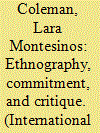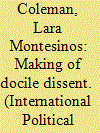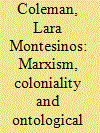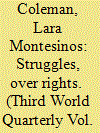|
|
|
Sort Order |
|
|
|
Items / Page
|
|
|
|
|
|
|
| Srl | Item |
| 1 |
ID:
141301


|
|
|
|
|
| Summary/Abstract |
This article addresses the vexed question of relations between critique and political struggle. As emphasis upon the “impact” of research increases, possibilities of integrating research into practices of resistance have been highlighted. Such approaches lend themselves to ethnographic methods, with scholars engaged in these ways offering nuanced reflections on possibilities of “bridging gaps” between research and solidarity. Here, however, I draw on over a decade of “activist” ethnography to highlight risks of conceptual enclosure associated with this move. The politics of struggle are quickly erased through available categories and problematics, which are readily absorbed into existing constellations of power. By contrast, the gaps between solidarity and writing provide spaces for emergence of a critical attitude—along lines sketched by Foucault. Nevertheless, to “apply” Foucault to this sort of ethnography carries a risk of betrayal. Foucault's critical ethos can be neither starting point nor end of engagement with actually existing struggles. Inspired by the philosophical tradition in which Foucault's work was rooted, I advocate a practice that gives weight to ontologies emerging from struggle as conjectures perpetually in question. This implies not closing gaps but a persistent back-and-forth between critique and commitment—risking ourselves as subjects at both ends.
|
|
|
|
|
|
|
|
|
|
|
|
|
|
|
|
| 2 |
ID:
124455


|
|
|
|
|
| Publication |
2013.
|
| Summary/Abstract |
This study is about strategies of neoliberalization in relation to practices of dissent and resistance. It explores how struggles arising in the context of neoliberalization may be subject to entanglement within the very processes they seek to contest and-in so doing-interrogates the political stakes of neoliberal governmental rationality. Drawing upon extensive ethnographic research, I trace the international trajectory of mobilizations against the dispossession visited upon Colombian farmers in the context of BP's investment in oilfields in the mid-1990s. Reasoning through attention to the ways in which this one specific struggle was neutralized, I suggest that a key aim of neoliberal strategies of political control is to accomplish a sort of "political hygiene" by nullifying politically surplus subjects and containing dissent within manageable parameters. The invocation of discourses of rights and civil society can be seen to be integral to neoliberal political rationality in this regard, but rights are comprehended within a symbolic structuration of the population that coincides with neoliberal logics. I suggest that such logics are directed not so much at incorporating the population into a generalized "right of death and power over life," as Foucault famously put it, but at inscribing subjects into networks of unstable and precarious private contract that constrict the wider obligations of population and citizenship commonly associated with liberalism. Discourses of rights, civil society, and development are not antidotes to socioeconomic dispossession or armed repression. Rather, all of these are complementary components of strategies aimed at the domestification of dissent.
|
|
|
|
|
|
|
|
|
|
|
|
|
|
|
|
| 3 |
ID:
178132


|
|
|
|
|
| Summary/Abstract |
At the heart of Global Capitalism, Global War, Global Crisis is a revolt against fetishism: the appeal to abstract categories, treating concepts as if they referred to things ‘out there’ in the world, independent of social relations). It is commonplace to note that studies of international relations routinely fetishise a system of ‘sovereign’ states, abstracted from history and the social relations, practices and ideologies that sustain state power. What Bieler and Morton emphasise is that even ‘Left’ analyses routinely make fetishistic appeal to concepts – ‘the state’, ‘the market’, ‘security’, ‘production’, ‘finance’, ‘knowledge’ – which are treated as things-in-themselves, devoid of human beings in their concrete social relations.1 Despite some scholars’ careless applications of the label ‘Marxist’ to such work, Bieler and Morton’s critique is very much in line with Marx’s own critique of a tradition of classical political economy so beholden to the modern obsession with uniformity and universality that it forcibly read history through the categories of bourgeois ideology (abstract individuals interacting in ‘the market’ and so on) that were made to look like ‘general preconditions of all production’
|
|
|
|
|
|
|
|
|
|
|
|
|
|
|
|
| 4 |
ID:
139765


|
|
|
|
|
| Summary/Abstract |
What should we make of appeals to human rights in the context of struggles against dispossession or armed repression? After the ‘death of man’ as transcendent ground of all right, critics have highlighted the disciplinary effects and absolutist tendencies of human rights discourse. However, attempts have been made to ‘rescue’ human rights – and wider forms of humanistic advocacy – as an immanent, self-grounding ethical practice. Drawing on analysis of struggles over natural resource extraction and indigenous rights in Latin America, this paper argues that such accounts mirror the assumptions of a predominant mode of international humanitarian activism. By reifying humanistic ideals, without sufficient attention to the effects of practices within which rights are invoked, both obscure entanglements between humanist interventions and logics of dispossession. This is particularly significant at the current juncture. Through these interventions rights have been absorbed into a neoliberal regime of truth in which the subjects of rights are interpellated as parties to private contract, such that rights themselves become tools of exception. Taking struggle as a starting point, by contrast, highlights not only the indeterminacy of rights but also the potential of human rights discourse to disrupt these logics. Through ethnographic engagement with ‘people’s hearings’ into ‘Multinational Corporations and Crimes against Humanity’ in Colombia, I revisit the questions of ‘the human’ and ‘rights’ and propose a more dialectical approach to the relation between normative principle and immanent critique.
|
|
|
|
|
|
|
|
|
|
|
|
|
|
|
|
|
|
|
|
|